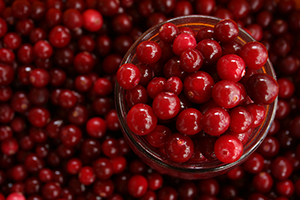Cranberry And Vitamin C Supplements
Cranberry And Vitamin C Supplements
Cranberries are a dark red fruit that are commonly found in America, Canada and Chile. This species of cranberry is known as Vaccinium macrocarpon. Cranberries can also be found in the UK and other European countries, but are a different species known as Vaccinium oxycocco.
Cranberries are mostly found in products such as cranberry juice, sauces and jams, but can also be eaten dry or whole. However, the whole fruit is not overly popular due to its tart taste.
Cranberries and cranberry products have soared in popularity in recent years and for good reason. They are a rich source of anthocyanins, which are known to possess antioxidant and anti-inflammatory properties. Cranberries are also a rich source of fibre and the essential nutrients vitamin C and manganese.
Please carry on reading to find out why you should include cranberry products more frequently than just on Christmas day!
What Are the Health Benefits of Cranberry Extract?
UTI in women
 Cranberry products are very popular with women who suffer from urinary tract infections, commonly known as UTI's.
Cranberry products are very popular with women who suffer from urinary tract infections, commonly known as UTI's.
Researchers used to believe that cranberry products worked by lowering the pH of the urine, turning it slightly acidic. It was thought that this acidic environment prevented the existence of the infective bacteria. However, it is now thought that cranberries help to prevent bacteria latching onto the lining of the urinary tract, which stops them from multiplying.
As a result of this, cranberry juice appears to be effective for preventing UTI's but may not be overly effective in the treatment of symptoms, contrary to anecdotal reports.
Antioxidant
Cranberries are rich in polyphenols which are fantastic antioxidants. We require a rich supply of antioxidant compounds to neutralise the threat of free radical molecules. These molecules are unstable and can cause our body harm by potentially damaging cells and DNA, which can in turn stimulate diseases such as cancer. Antioxidant compounds such as the ones found in cranberries are able to becalm this situation by stabilising the molecule, thus protecting the health of cells.
Vitamin C
Cranberries are a rich source of vitamin C, with a 100g portion providing 18% of the NRV. It is important for optimal health to have sources of vitamin C in the diet every day. This is because vitamin C, also known as ascorbic acid, is a water-soluble vitamin meaning our bodies do not have the capacity to store it.
Vitamin C has been scientifically proven to:
• Maintain the normal functioning of the immune system, especially during and following exercise sessions
• Contribute to collagen formation
• Contribute to health and function of blood vessels
• Help to maintain bone and cartilage function
• Support teeth and gum health
• Help maintain healthy skin
• Aid the absorption of iron
• Reduce tiredness and fatigue
• Contribute to the metabolism of the foods we eat
• Support the nervous system
• Uphold normal psychological function
• Protect our cells from oxidative stress – as it is also an antioxidant
• Aid the functioning of vitamin E.
Manganese
Alongside its vitamin C qualities, cranberries and cranberry extract is also a source of the mineral manganese. 100g of cranberries will provide 17% of the daily NRV.
The actions of this mineral compliment the polyphenols and vitamin C found in cranberries as manganese has been scientifically proven to:
• Contribute to the metabolism of the foods we eat
• Maintain healthy bones
• Contribute to the formation of connective tissues such as tendons and ligaments
• Protect our cells from oxidative stress by stabilising free radical molecules.
There is also evidence to suggest that manganese is important for fertility, brain function and blood clotting. Although it is only classed as a trace mineral because it is needed in small amounts, it is clear to see that manganese is important for health! Other good sources of manganese include wholegrains, nuts, seeds and leafy vegetables. As it is estimated that over a third of us could be deficient in this mineral, eating these foods regularly, or using a supplement containing manganese, is important to maintain optimal health.
Fibre
 Like most berries, cranberries are a great source of fibre, as a 100g portion provides almost 5g. Also commonly known as roughage, fibre cannot be digested so it passes smoothly through the gut. This action helps to maintain a healthy digestive system.
Like most berries, cranberries are a great source of fibre, as a 100g portion provides almost 5g. Also commonly known as roughage, fibre cannot be digested so it passes smoothly through the gut. This action helps to maintain a healthy digestive system.
Government guidelines from 2015 recommend that adults aim to consume 30g of fibre per day. This is for good reason, as a healthy fibre intake is correlated with a decreased risk of suffering from diabetes, cardiovascular disease, neurovascular disease and certain cancers such as bowel cancer.
Alarmingly however, many of us are not meeting this recommendation, as men on average are only achieving 20g and women just over 17g. A simply way to make a big difference to our health is to increase the intake of fibre in the diet.
Other than fruits (especially berries), food items such as vegetables, wholegrains, nuts, legumes and cereals are all good sources.
Quercetin
Alongside the rich content of anthocyanins, cranberries also contain bioflavonoids. Within the family of bioflavonoids is a compound called quercetin. Quercetin has been shown to have various benefits to our health.
With regards to cardiovascular function, daily supplementation of 730mg of quercetin has been shown to reduce both systolic and diastolic blood pressure by, on average, 7mmHg and 5mmHg respectively. Blood pressure was found to return to original values once supplementation was discontinued, so it has been suggested that regular intake may be beneficial.
Quercetin is also thought to offer neuroprotective properties as it has been shown to reduce the concentrations of inflammatory markers in the brain. As Alzheimer's and Parkinson's diseases are associated with an increase in cerebral inflammation, quercetin could play an important role in decreasing the prevalence of these conditions. Like much research in the area of nutrition, studies in to the effects of quercetin are in their infancy and hopefully there will be further evidence to substantiate these claims in the coming years.
Aside from cranberries, quercetin is also found in large amounts in onions, apples and gingko biloba.
How Much Cranberry Extract Should I Take?
 For eating whole cranberries, a 100g portion would provide a rich source of polyphenols, vitamin C, manganese and fibre. With regards to cranberry juice, 200-300ml per day is a sufficient amount. However, as many people do not like the taste of fresh, whole cranberries and are put off from cranberry juice due to the high sugar content, many people are using cranberry extract supplements.
For eating whole cranberries, a 100g portion would provide a rich source of polyphenols, vitamin C, manganese and fibre. With regards to cranberry juice, 200-300ml per day is a sufficient amount. However, as many people do not like the taste of fresh, whole cranberries and are put off from cranberry juice due to the high sugar content, many people are using cranberry extract supplements.
For cranberry extract supplementation, it appears that many people see a benefit when taking between 150-750mg per day. Although cranberry extract can be taken on an empty stomach, it is recommended that the capsules are taken alongside meals, especially ones that contain another source of vitamin C, as this will help to augment the absorption of the polyphenol qualities that people are seeking.
What Are the Side Effects of Taking Cranberry Extract?
Cranberry products and extracts are likely to be safe for most people when taken orally. However, caution must be exercised with regards to drinking too much cranberry juice as large amounts (1 litre) can cause gastrointestinal issues in some individuals. More seriously, cranberry juice and extracts contain a large amount of a compound known as oxalate. As kidney stones are primarily made up from calcium and oxalate, cranberry products are not recommended for individuals with a history of kidney problems.
Individuals who suffer from diabetes also should be cautious when taking cranberry juice as these products are often high in sugar, with little fibre. A good alternative would be whole cranberries or cranberry extract, but make sure blood sugar levels are still monitored diligently.
A high intake of cranberry products is also thought to moderately interact with the drug warfarin, which is taken to slow the rate of blood clotting. The nutrients in cranberries may accentuate the effects of the warfarin so make sure you speak to your GP before incorporating more cranberries into your diet.
Due to there not being sufficient evidence regarding the safety of cranberry products for pregnant or breast-feeding women, this is not currently advised.
Summary
In conclusion, cranberries are a nutritional powerhouse, containing a range of ingredients that actively support health on numerous fronts. By including cranberry products into your diet, you will be well on the way to maintaining health and wellbeing.
Take home points:
• Cranberries are a dark red fruit found in many different countries in both North America and Europe.
• Cranberries are nutritionally dense, providing a rich amount of polyphenols (anthocyanins and bioflavonoids), vitamin C, manganese and fibre.
• The active ingredients in cranberries are thought to play various roles in the body such as helping to prevent UTI's, neutralising free radicals, becalming inflammation, helping digestion, blood pressure, metabolism, immune function and bone health to name a few.
• 100g of whole cranberries, 200-300ml of cranberry juice, and 150-750mg of cranberry extract are the doses that are popularly taken to exert a beneficial effect.
• Cranberries and cranberry products are likely to be safe, but caution is advised if you have suffered from kidney issues and diabetes, if you are taking warfarin or pregnant.
Shop for Cranberry Supplements here
Sources:
http://jn.nutrition.org/content/137/11/2405.abstract
https://www.ncbi.nlm.nih.gov/pubmed/21596685
https://examine.com/nutrition/cranberry-juice-for-utis/
Cranberry And Vitamin C Supplements
Source: https://www.simplysupplements.co.uk/healthylife/supplements/cranberries

Tidak ada komentar:
Posting Komentar